


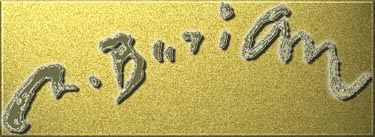
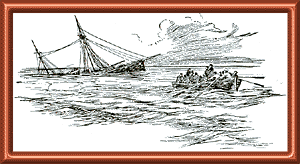 Well, I don't read Czech or Slovak, so I've
had to piece together most of what follows. If I make some factual
errors, it's not from lack of effort. Much of the following biographical
data is from a short essay by Camille Cazedessus, Jr. in his long
running fanzine, ERBdom, issue #68, March 1973.
Well, I don't read Czech or Slovak, so I've
had to piece together most of what follows. If I make some factual
errors, it's not from lack of effort. Much of the following biographical
data is from a short essay by Camille Cazedessus, Jr. in his long
running fanzine, ERBdom, issue #68, March 1973.
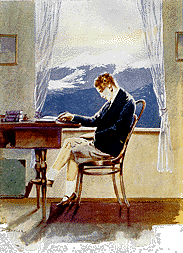 Zdenek
Burian (Zdenek is pronounced "Zeh-DEN-yeck" because
there's a little "v" over the n. "Burian is "BURR-ee-yahn"
- pronounciation courtesy of the eminent William Stout - thanks,
Bill.) was born in 1905 in Moravia, Czech Republic. He was to
become one of the most influential depicters of prehistoric life
of the century, rivaled only by Charles R. Knight.
Zdenek
Burian (Zdenek is pronounced "Zeh-DEN-yeck" because
there's a little "v" over the n. "Burian is "BURR-ee-yahn"
- pronounciation courtesy of the eminent William Stout - thanks,
Bill.) was born in 1905 in Moravia, Czech Republic. He was to
become one of the most influential depicters of prehistoric life
of the century, rivaled only by Charles R. Knight.
In 1923 he was enrolled as "a student in the second year" at the Academy of Graphic Arts in Prague. I assume that to be equivalent to a Sophomore in college. He was a published illustrator at the time. Apparently he wasn't making a living at it, though, as he worked as a construction laborer to pay his tuition. He flunked out of school and moved outside of Prague. He performed odd jobs for a living while he painted adventure illustrations, effectively teaching himself "using different techniques" until developing his own style. The economy of the time forced him further into the surrounding countryside where he became a "backwoodsman" for a time, living off the land. This personal bond with nature would follow him his entire life and give his paintings a reality that was honest and special.
Zdenek Burian a Paleontologie (Zdenek Burian and Paleontologie), by Vladimir Prokop, in what I take to be a listing of his published work, lists illustrations for an edition of Robert Louis Stevenson's David Balfour in 1921. That would make him 16. Other illustration work followed, and in 1927 he began a long association with the publisher Vilimek. His work began to appear in their magazines for boys: World of Adventure and Young Readers. The following year he illustrated, among other books, Srdce, by Edmondo de Amicis. The frontispiece to the book is above left and one of the many line drawings is above right.
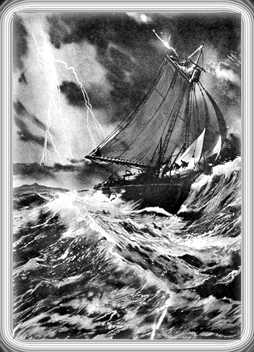 Throughout the 1930's he primarily illustrated
stories by both Czech and English/American writers. A lot of it
was Western fiction by the likes of James Oliver Curwood, Zane
Grey, and a German author named Karel May. Also receiving the
Burian touch were translations of Kipling, Verne, Dumas, London,
etc. The image at right is from 1937 for a Kipling story. Quite
an improvement over the Srdce illustration of nine years
previous. A lot of this material was done for another publisher
with whom he had a long-term relationship, TaM. He would work
for both TaM and Vilimek almost into the 1950's.
Throughout the 1930's he primarily illustrated
stories by both Czech and English/American writers. A lot of it
was Western fiction by the likes of James Oliver Curwood, Zane
Grey, and a German author named Karel May. Also receiving the
Burian touch were translations of Kipling, Verne, Dumas, London,
etc. The image at right is from 1937 for a Kipling story. Quite
an improvement over the Srdce illustration of nine years
previous. A lot of this material was done for another publisher
with whom he had a long-term relationship, TaM. He would work
for both TaM and Vilimek almost into the 1950's.
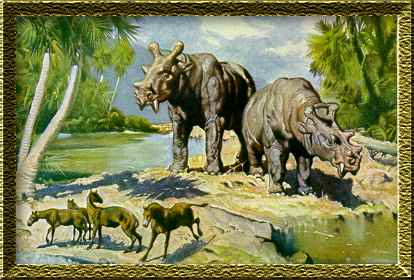 Also during this time, his fascination with
prehistory was first manifest. a Paleontologie shows two
examples from this period. One is a 1932 scene of Neanderthals
fleeing a herd of mastodons and the second, from 1935, is at left
and presages the Augusta books that were soon to come.
Also during this time, his fascination with
prehistory was first manifest. a Paleontologie shows two
examples from this period. One is a 1932 scene of Neanderthals
fleeing a herd of mastodons and the second, from 1935, is at left
and presages the Augusta books that were soon to come.
Burian made a trip to nearby Italy during the late thirties, but was never to leave Czechoslovakia again.
Augusta is Professor RNDr. Josef Augusta, DrSc. and spent a majority of his career as a paleontologist in the attempt to clearly describe and communicate the past to modern readers. "Perhaps (his) greatest assets are his ability to convey the significance of vast numbers and huge sizes, and the way he succeeds in linking the distant past of our planet with our modern life." His association with Burian can be traced as far back as 1941, when his name first appears in the a Paleontologie bibliography.
By the way, I can't prove it, but I'm pretty sure that the title of Prokop's biography is a pun of sorts. Paleontology is the 'study of the past' and this book is an exploration into the past of this great artist.
|
World War II constrained Burian's output considerably. The Prokop bibliography contains over a dozen entries for almost every year of the decade through to 1941, with over 20 entries for 1939. There are only four listings, total, for the years 1943 and 1944, with zero for 1945. After the war he again is working with Augusta in 1947 - drawing the past. The work they did together, from images like the mastodons* at right from 1941, to their work up to Augusta's death in 1968, was magnificent and represented some of the most current views of prehistoric life at the time. *This image appears in Mammoths, Life Before Man and Dawn of Man. |
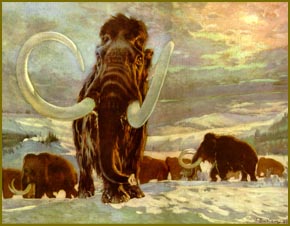
|
Their published efforts, eventually translated into English and printed in the early 1960's by Paul Hamlyn in England, include:
| Prehistoric Animals 47 pages of text, 60 illustrations (half in color). (10.25"x13.75"). The 1955 film, Journey to the Primeval Age, was based on this book and won prizes at the Mannheim and Venice Film Festivals. | 1956 |
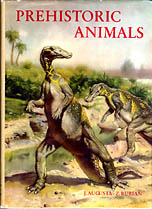
|
| Prehistoric Man 45 page introduction by Augusta, 52 plates (25 in color, 17 in limited color or b&w). (10.25"x13.75") | 1960 |
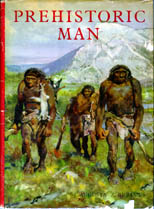
|
| Prehistoric Reptiles and Birds 104 pages, 36 illustrations, including 15 color plates. (9.5"x10.75") Two b&w images from A.C. Doyle's The Lost World. | 1961 |
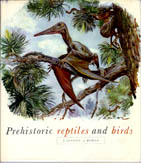
|
| A Book of Mammoths 19 color plates (five double page), eleven duotone plates (one double page) and numerous small b&w pencil drawings. (10.25"x13.75") | 1963 |
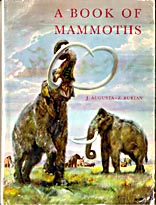
|
| Prehistoric Sea Monsters 67-page b&w illustrated introductory text by Augusta, 22 plates (18 in color and four of those are double page) (10.25"x13.75") | 1964 |
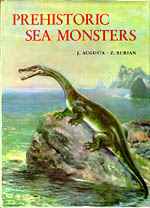
|
| The Age of Monsters 23 color plates (four double page), 80 pages text by Augusta illustrated with b&w fossil photos. (10.25"x13.75") | 1966 |
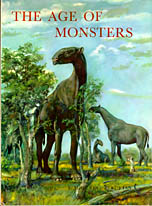
|
| Life Before Man (text Zdenek V. Spinar) 228 pages. 162 color illustrations, many (all?) taken from the six Augusta books listed above. (8.5"x11") | 1972 |
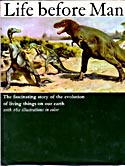
|
| The Dawn of Man (text Josef Wolf) 231 pages. 254 illustrations, 190 in color, many (all?) taken from the six Augusta books. (8.5"x11") | 1978 |
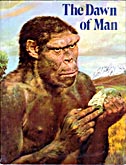
|
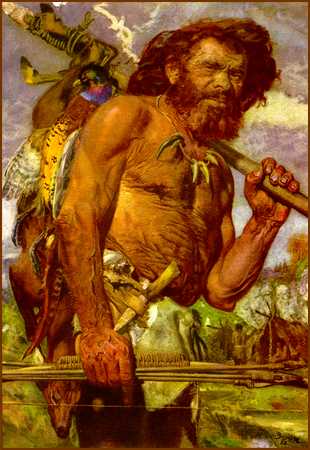 His work was much more than just creating
illustrations for text. He created his drawings "under the
direction of " Augusta, implying a close collaboration that
resulted in the most accurate (for the time) recreations of the
fauna and flora of the early earth. The images were very popular
and appeared in many books about dinosaurs and prehistoric man.
Burian's attention to detail and his knowledge of nature helped
him create the definitive views of the past for those of us growing
up in that era. That Cro-Magnon hunter at left was a very familiar
image when I "rediscovered" it in my copy of Prehistoric
Man in the 1970's.
His work was much more than just creating
illustrations for text. He created his drawings "under the
direction of " Augusta, implying a close collaboration that
resulted in the most accurate (for the time) recreations of the
fauna and flora of the early earth. The images were very popular
and appeared in many books about dinosaurs and prehistoric man.
Burian's attention to detail and his knowledge of nature helped
him create the definitive views of the past for those of us growing
up in that era. That Cro-Magnon hunter at left was a very familiar
image when I "rediscovered" it in my copy of Prehistoric
Man in the 1970's.
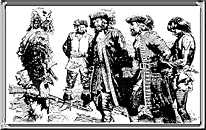 Jumping back a bit, his work in the 1950's
and 1960's wasn't all devoted to reconstructing the past. At right
is an image from Robinson Crusoe done in 1955 and below
is one of his many Tarzan illustrations, this probably
from 1969. The image is from the aforementioned ERBdom
#68. Caz also published a portfolio of his Tarzan drawings
in 1973 called Jungle Scenes of Tarzan. Wish I could
find my copy.
Jumping back a bit, his work in the 1950's
and 1960's wasn't all devoted to reconstructing the past. At right
is an image from Robinson Crusoe done in 1955 and below
is one of his many Tarzan illustrations, this probably
from 1969. The image is from the aforementioned ERBdom
#68. Caz also published a portfolio of his Tarzan drawings
in 1973 called Jungle Scenes of Tarzan. Wish I could
find my copy.
It's been estimated that Burian illustrated over 500 books, stories and articles during his career. The pundits put the grand total of his drawings and paintings in the 15,000 range. When you consider that less than 500 of these are the paleontological recreations for which he is so well known, you realize that there is a rich collection of fantastic illustration sitting on the shelves of many a Czechoslovakian library.
Burian died in 1981, actively working up until his death. I
don't know the location of the many thousands of his originals,
but I hope that some enterprising Czech will make the brilliant
step of crafting a collection of his work for international sale.
I know I'd buy one (or ten).
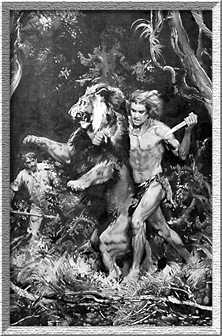
 To learn more about Zdenek Burian, see:
To learn more about Zdenek Burian, see:| ERBdom #68 | Camille Cazedessus, Jr. 1973 |
| Zdenek Burian - a Paleontologie | Vladimir Prokop, 1990 Vydal Ustredni Ustav Geologicky |
| The Vadeboncoeur Collection of Knowledge | Jim Vadeboncoeur, Jr. 1998 |
|
Illustrations are copyright
by their respective owners. This page written, designed & © 1998 by Jim Vadeboncoeur, Jr. Updated 2011. |
